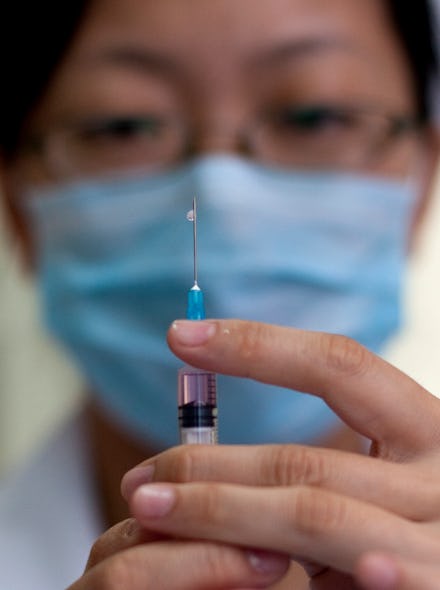Mayo Clinic Researchers May Have Discovered a Cure for Cancer Hidden in an Unlikely Vaccine

The news: In the past few years, we've seen the introduction of a cervical cancer vaccine and a prostate cancer vaccine — but what if a vaccine could actually cure cancer, instead of just preventing it?
According a new, promising study by the Mayo Clinic, that possibility might be more real than you might think. The famous medical research center announced Wednesday that one of its patients is in remission without a trace of cancer left in her body — all after receiving a single, massive dose of the measles vaccine.
The patient, a 50-year-old woman named Stacy Erholtz, had an aggressive form of blood cancer that spread throughout her entire body over the course of 10 years. Out of conventional treatment options, she decided to participate in the Mayo Clinic's experimental study. The researchers injected Erholtz with a hefty dose of the measles vaccine — enough to inoculate 10 million people. After a single dose, she was in complete remission.
"It's a landmark," said Stephen Russell, who spearheaded the Mayo research. "We've known for a long time that we can give a virus intravenously and destroy metastatic cancer in mice. Nobody's shown that you can do that in people before."
How it works: Previous research on mice has shown that intravenous viral therapy can overwhelm cancer cells and cause them to explode. Certain viruses — such as herpes and poxvirus — have been found to be effective; they "bind to tumors and use them as hosts to replicate their own genetic material; the cancer cells eventually explode and release the virus," explains the Star Tribune.
It's important to distinguish that the measles vaccine will not work for all types of cancer. The other patient who participated in the study did not sustain the same results that Erholtz did. The efficacy of the treatment also depends on the patient's immune system. Most people have been inoculated for measles, but those with suppressed immune systems have a high chance of responding to an introduction of the virus. Erholtz, for instance, had limited previous exposure to measles and a weakened immune system.
Doctors also only have one chance to get the treatment right. Once the body recognizes the virus, it will attack it the second time before it has a chance to bond to the cancer cells. It's a matter of getting the dose right the first time around, and further research will focus on how to tailor the treatment for each patient.
But while the treatment is far from perfected right now, it's still an exciting breakthrough for the hundreds of thousands of people who suffer from myeloma — which is expected to kill over 11,000 people this year — or other forms of cancer that might respond to this approach.
The Mayo Clinic is planning on running a bigger trial in September, which will hopefully provide more insight on how to implement this method in the most effective way.